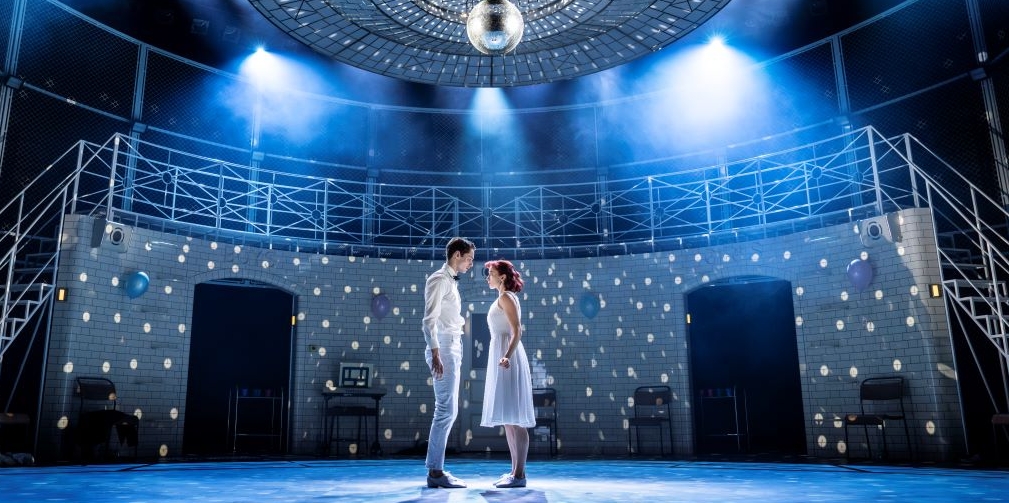I am fortunate to have seen Matthew Bourne’s Romeo + Juliet three times now – back in 2019 for the original version, a few weeks ago in Manchester on tour, and then again for its return to Sadler’s Wells. It is fascinating to see how the production has evolved, getting tighter, sharper and more incisively dark. One of this director’s great qualities is his restless willingness to change and develop his shows, and this example shows the benefits to great advantage.
It should be emphasised that this is Matthew Bourne’s version of the story rather than Shakespeare’s – or even Prokofiev’s. We are in the Verona Institute, a brutal institution of correction and imprisonment, rather than a Renaissance city; and Prokofiev’s music is rearranged and redeployed in ways that will surprise those familiar with the original ballet. Instead of rival families we have parallel dorms of Boys and Girls, all dressed in minimalist white uniforms. The set (another wonderfully flexible creation by Lez Brotherston) offers a similarly bleak white-tiled interior with a metal walk-way above and multiple doors leading off through grills and fences, snapped open and shut by crisply dressed medical orderlies or thuggish security guards. The menace is intensified right from the start with the repetitions of the ominous ‘Dance of the Knights’ to which the inmates perform ritualised exercises.
The storyline emerges quickly. Juliet is introduced and quickly subjected to sexual abuse at the hands of Tybalt (here one of the guards), an episode all the more disturbing because it is suggested rather than shown. Mercutio, his boyfriend Balthasar, and Benvolio provide animation and high-jinks and joshing energy in the opening scenes; and then we meet Romeo, dumped at the Institute by his coldly ambitious politician-parents. Romance in these straitened circumstances gets a helping hand and some sly connivance from the one benign adult figure, Rev Bernadette Laurence.
A remarkable sequence of set-pieces follow, with the Capulet ball transformed into an in-house disco which escapes the grip of the authorities; a ‘pas de deux’ for the love-duet that must contain the longest kiss in ballet; and disturbingly authentic accounts of the deaths of Mercutio and Tybalt where the violence of the action is effortlessly transferred and transmuted into the choreography. Bourne has a particular skill in taking music associated with one classical dance genre and mood and matching it with modern dance rhythms and a wholly different emotional aureole of associations. This is carried to its apogee in the second sequence for Romeo and Juliet after the murders where a section of the original ballet is repurposed to revelatory effect. Just as you think you have reached the emotional highpoint of the evening it is surpassed by another. The denouement too is completely reimagined with great economy.
The performance is hugely enhanced by the contribution of a live orchestra ably conducted by Brett Morris. Terry Davies’ version of the score is a genuine rearrangement for chamber orchestra, which alters tempi and orchestration at points. However heretical this might seem, it really works in relation to what you experience on stage where the huge scale of the 1930s score would not. In fact this is indirectly a tribute to the depth and flexibility present in the original that it all adapts so well to a fresh scenario.
Several of the key roles in this production are played by dancers who starred in the premiere four years ago. Celia Braithwaite and Paris Fitzpatrick return to the leads, but with even greater psychological depth and variety to their performances. There is a real chemistry between them and a plausible sense of pre-existing damage for which their passion is both a healing and an unravelling. Ben Brown is a delightfully impish and skittish Mercutio and his unaffected gay relationship with Jackson Fisch’s Balthasar is wonderful to see. For this show to work there has to be a credible villain too, and Danny Reubens succeeded admirably if measured by the boos at the curtain call. But this was a performance of depth as well as cruelty, with the character’s crumbling mental health clearly signalled at points. Anya Ferdinand as Frenchie, provided a useful balancing bestie for Juliet, and Daisy May Kemp was wholly credible as the daffy but kindly Reverend, all baggy cardigan and fluttery hugs.
The programme quotes Harley Granville Barker’s view that this story is in essence ‘a tragedy of youth as youth sees it.’ If that is the test, rather than any artificial standard of fidelity to Shakespeare, then Matthew Bourne’s reimagined version is a triumphant success. It is also a thoroughly engrossing, at times thrilling, evening in the theatre that finds new magic in old formulas while not shying away from disturbing and difficult themes given their full dramatic weight.

